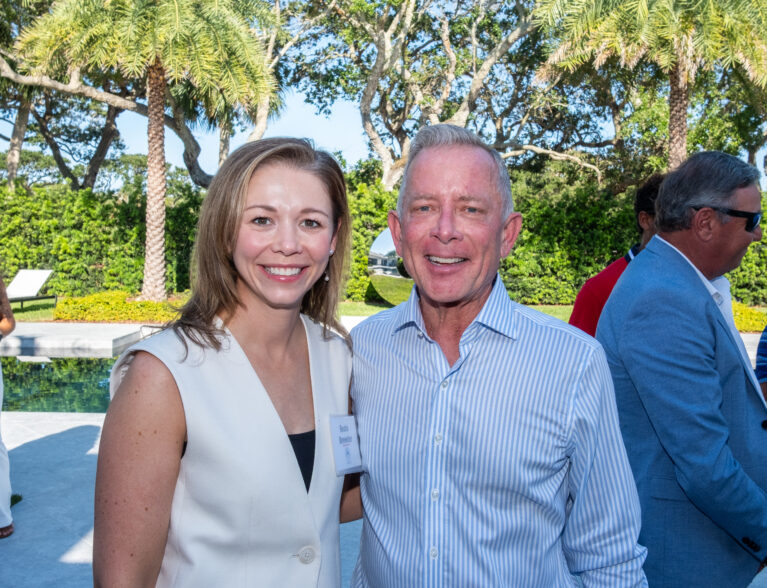
Supporters of Float Hope, which provides free swimming instruction to underserved children, gathered for a reception at the beautiful home of founders Jeff and Eilis Powers, where the poolside setting highlighted the importance of that skill.
“We put 350 children in the water this year. And that is because of you guys. It’s 100 percent tied to funding. And the problem is, this year we’re going to try to top it,” said Jeff Powers.
“Thank you all for coming out and your continued support,” said Beata Brewster, executive director.
“Usually, I get up here and talk about statistics. Many of them are happy, some of them are sad, but generally we’re talking about the safety skills that you are all gifting the children of our community.”
This time, she said, they had invited Cori Welbes to share how swimming can help children who have suffered trauma or other adverse experiences.
“We know that a lot of the population that we serve has an increased number of what’s been called ACEs, or adverse childhood experiences. Swimming does really magical things for the brain and also helps heal some of that trauma,” said Brewster.
Welbes, staff development administrator at Florida Sheriff’s Youth Ranches, is the former chair of Florida Swim Safe Sport, was a lifeguard instructor for nearly five decades and is a former synchronized swimmer.
Welbes said that her son had been an angry child from birth. When she began to research possible reasons, she learned about brain science, from the prefrontal cortex, where rational thinking occurs, to the amygdala, which releases cortisol and adrenaline into your body when you’re scared.
With some children who experience fear, the feeling never goes away, so they tend to always be on the lookout for danger, real or imagined.
“Swimming, however, can help regulate that through breathing. If we breathe while we swim and while we kick, our brain’s going, ‘Yes, I’ve got control. I know how to do this,’” she explained.
Her “angry little son” learned to regulate his anger through swimming and now, as a 35-year-old ICU nurse, still swims or runs to regulate stress.
She spoke about the evidence-based practices espoused by Dr. Karyn Purvis, co-creator of Trust-Based Relational Intervention, including connections, empowerment and correcting.
“When we’re working with kids, we want to give kids a center for their lives; a connection that’s going to be with them forever. That is what you’re doing through this work,” said Welbes.
“Teaching kids how to swim is going to keep them safe,” said Welbes, adding that it provides a life skill that will center them for the rest of their lives.
“And I’m sorry, but it should be one of the most major, important life skills that everybody should learn. It shouldn’t just be for people that have a pool or a lake or a river. Everybody needs to know how to swim. Hats off to all of you. Just know that what you’re doing is life changing,” said Welbes.
Brewster stressed that the children in our community do not have ready access to swimming lessons, and that, despite its importance, swimming is not part of the school curriculum.
“So what we’re doing, all together, is giving these kids a life skill, giving them the ability to be part of a team and part of a larger community. We believe it’s truly transformational and it’s something that just wouldn’t be possible without all of you,” said Brewster.
For more information, visit FloatHopeNow.org.
Photos by Joshua Kodis




























